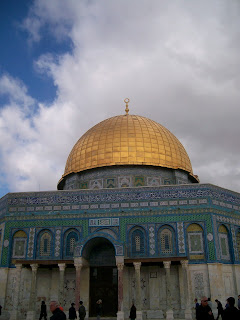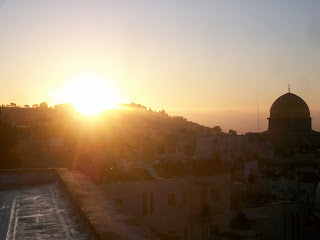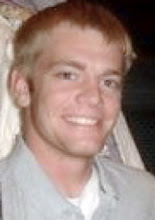I was sent an email today asking to tell about the plight of the Jews and the pressures they face and fears that they have. There were questions about rockets being fired at Jewish towns daily, antisemitism in the region and violence over the Temple Mount. Questions were also raised about Biblical prophesy and implications of Israel/Palestine conflict in that context. I would like to say that this program does a pretty good job of showing both sides to issues and we have heard from several Israelis on their side of the conflict.
I would like to say that a lot of things have been misconstrued in the American media. We have read some papers written about how pro-Israel the media is, the power the Jewish lobby has over how Israel is perceived in America, and how hard Israel works on its own media machine. When I came to the Middle East, I thought that the whole region hated Jews and they were constantly terrorizing Israel and the like. That is what I had been told by the American media. Palestinians were terrorists and Israelis were only defending themselves.
However, through our extensive reading, listening to many speakers from governments, churches, social organizations, etc. as well as living in the Middle East and making friends with Muslims, Christians and Jews, I have changed my mind on a lot of things. I dont think that I am pro-Palestinian in the sense of being blind to the other side. I sympathize with some things the Jews face everyday, as well as being aware of the injustices the Palestinians endure. With that I will offer my limited knowledge on the Jewish side of the conflict and my personal opinion about it.
First of all, when I ate Sabbath dinner with a Jewish family and connected with an Israeli soldier, he was very interested in what I was seeing in Arab countries, saying that he would never be able to travel the region, because he believed there would be a violent response to his presence. He sees the region as antisemitic for sure. I believe that most Jews believe that the region hates them for their ethnicity and point to remarks by the Iranian government as proof. I believe that their oppression of the Arab Palestinians has a lot to do with their standing in the Middle East. They stole land from an Arab neighbor and no Arab country is ready to accept them as a welcome part of the region as long as they violate United Nations resolutions and human rights agreements. I don't believe that they are hated as Jews, I believe that they are hated as oppressors of Arabs.
Second, the rocket attacks are a huge tool for Israel to gain sympathy from the international media. There have been no rocket attacks on Israeli town since the Gaza War in January of this year. And when rockets are mentioned, they are referring to small homemade weapons with extremely limited range being fired from rooftops of Gazan towns. Look at the casualty numbers during the Gaza War to figure out who was taking "rocket fire" and who was targeting civilians and turning homes into war zones. 1,268 Gazans were killed, including 288 children and 103 women, with 85% of these casualties as non-combatants (http://news.bbc.co.uk/2/hi/middle_east/7855070.stm). From the entire Israeli population, from Israeli soldiers who invaded Gaza, to those who took the "rocket fire", only 13 died with 10 of those being combatants. Amnesty International has accused Israelis of targeting schools, hospitals and withholding medical assistance to Palestinians. Israel claims Hamas was using its own citizens as human shields, which has since been investigated and found to be baseless. Hence, the famous Goldstone Report on the war crimes of the War in Gaza. Since the Gaza War, there has been very little rocket activity from Gaza, with the Israeli Defense Forces shooting anyone near the border and the Hamas Qassam rockets lacking the range to legitimately fire into Israeli towns. In the West Bank, there has been little to zero terrorist activity since the 2nd Intifada in 2001. So, in my opinion I don't believe that Israelis live in constant fear of rocket attacks and terrorism, because there is no real threat anymore. Also, there is a major study going on right now, about how every Hamas terrorist attack has been in direct reaction to an Israeli attack.
Third, on the issue of dispute over the Temple Mount, referring to the Wailing Wall, the Dome of the Rock and the Al-Aqsa Mosque, the Israelis retain full control of the area. According to Judaism, the 3rd Temple must be built on this Temple Mount, meaning that the Muslim holy places must be destroyed. Therefore there is heavy IDF security all around the Temple Mount area, and severe restrictions are placed on Muslim Palestinians who wish to visit their own holy sites. They are only allowed to visit during certain hours, even though I and other foreigners, Jews, etc. can visit at any time. There have been several Zionist plots to blow up the Muslim holy sites, rather than Muslim plots to wage war on the Wailing Wall. Control for this controversial site, as well as how to divide up Jerusalem remain the main obstacles to a peace agreement.
As far as how the Bible relates, I do not believe that the Jews have a right to the land. I believe that Jesus changed the entire covenant about the "Chosen People" and, as people who blatantly reject Jesus, they have no right to any part of His Kingdom (although they are always welcome to accept Jesus' sacrifice). Disclaimer here: I am not one of these people who believe that the key to the end times is converting Jews. Jews know who Jesus is, they don't need to be taught. I also do not serve a God whose plan could involve ethnic cleansing and murder to put a people who has rejected His Son in a land in which they could continue to oppress Christians. (Keep in mind that the Christian community in the Middle East lies with Arabs. There is a very real Christian presence in Syria, Palestine, Lebanon, Egypt and Iraq.) Therefore, I am definitely opposed to Christian Zionism, but that does not prevent me from loving Jews. I think that we cannot paint all the Jews as Zionist, because the vast majority aren't. The same is true when looking at Palestinians as violent resisters or terrorists. As I look around Jerusalem, I don't feel like this land is all that Christ-like. I see a lot of religion here, and I don't care for religion.
All in all, there is valid reason for Jews to feel cut off from the rest of the Middle East. They teach their children English rather than Arabic (which is spoken by the entire region in which they live), they erect a wall to keep Palestinians out, even though Palestinians have pledged peaceful relations and have lived up to their promise, and treat their own Arab citizens of Israel as 2nd class. Yes, Iran, Hezbollah and Hamas aim to destroy Israel, but at this point the Israeli military is vastly superior and has done an excellent job of protecting its citizens, committing war crimes to do so. My belief is that whenever Israel recognizes a Palestinian state, allows refugees to return and begins to respect Palestinians as well as other Arab neighbors, they will see a huge difference in relations in the region.
This post has been a big catch all for my thoughts and feeling, while trying to give a bit of a glimpse at the Jewish point of view. I invite and welcome comments and critiques!













































